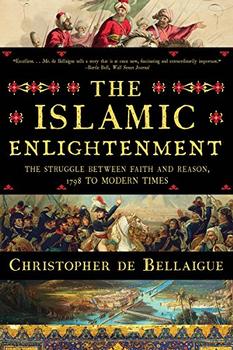Summary | Excerpt | Reviews | Beyond the Book | Readalikes | Genres & Themes | Author Bio
The Struggle Between Faith and Reason, 1798 to Modern Times

Critics' Opinion:
Readers' Opinion:
First Published:
Apr 2017, 432 pages
Paperback:
Aug 2018, 432 pages
 Book Reviewed by:
Book Reviewed by:
Lisa Butts
Buy This Book
In the case of De Amicis, the problems inherent in travel writing were compounded by the fact that he stayed in Istanbul barely a week and was in denial of the superficial nature of his engagement. Yet he was so sure of himself that he wrote Constantinople in the present tense, the tense of timelessness, as if all he witnessed had endured beyond his visit – and is carrying on right now, as we read.
De Amicis displayed his romantic sensibility to the fullest extent in his description of the city's dogs. This is a finely wrought Gothic vignette, all grotesque couplings, snarling battle royals and meatballs steeped in poison (distributed by a local doctor so he could get some sleep at night). For all its literary qualities, however, it leaves us in the dark as to the dogs' importance to the story of Istanbul's modernisation.
Not so a discussion of the same question by a Turk, Ibrahim Sinasi, a few years earlier. Born in Istanbul in 1826, Sinasi had received a wideranging education and gone on to father modern Turkish journalism, and his approach to the city's flee-ridden curs, rummaging through rubbish, barking, snarling and holding people up with their frenzied
turf wars or contests over a scrap of bone, was defiantly unpicturesque. It was utilitarian. Was it right, he asked in his newspaper column, that an 'upright person' be exposed to 'this kind of irrational beast' while going about his business in the city? He recommended that the dogs be removed, if necessary to rural areas where they could be used as guard dogs, before concluding with an aphorism of which Victorian health campaigners would have approved, and which translates loosely as 'cleanliness is next to godliness'. The difference between De Amicis' and Sinasi's treatment of the same issue – the resident who uses Istanbul versus the visitor peering through his opera glasses – is an eloquent warning against taking orientalist writing on trust.
In fact, the East of which these European visitors wrote was, in important ways, very different from the way they depicted it. Their received wisdom and assumptions, which they passed on to their readers in the West, were at best incomplete. The lands of which these and other writers wrote in terms of petrified strata were in fact shaking violently.
That earthquake had been caused by the very same West from which the travel writers came – Frenchmen, Englishmen, Iberians, Italians, who over the course of the eighteenth and nineteenth centuries sensed that the Ottoman Empire was weakening and fanned out to take advantage. Onto North Africa, the Levant, Turkey and Greece stepped these merchants, ambassadors, soldiers of fortune, poets, missionaries and, ultimately, occupiers. For symbolic reasons their first impact is often dated to Napoleon's invasion of Egypt in 1798, when one of the world's most modern societies collided with one of the most backward.
The mass arrival of Westerners in the Muslim world for the first time since the Crusades forced the region's elites – rulers and clerics, administrators and military commanders – to concede that only by adopting Western practices and technologies could they avoid political and economic oblivion. The extraordinarily rapid changes that followed have been neatly summarised by the historian Juan Cole.
In the space of decades intellectuals forsook Ptolemaic for Copernican astronomy . . . businessmen formed joint-stock companies (not originally allowed in Islamic law), generals had their armies retrained in new drills and established munitions factories, regional patriotism intensified and prepared the way for nationalism, the population began growing exponentially under the impact of cash cropping and the new medicine, steamboats suddenly plied the Red Sea and the Persian Gulf, and agrarian capitalism and the advent of factories led to new kinds of class conflict.
Change accelerated throughout the nineteenth century. It recognised no boundaries, no red lines. In the middle of the century the Ottoman Sultan declared equality between his Muslim and non-Muslim subjects, the slave trade was outlawed and the segregation of the sexes, symbolised by the harem, went into decline. The sheikhs and mullahs saw their old prerogatives in the law and public morality taken over by an expanding government bureaucracy. Clerical opposition to medical dissection was overcome and theatres of anatomy opened. Culture, too, was transformed, with a surge in non-religious education, and the reform of the Arabic, Turkish and Persian languages – the better to present modern poetry, novels and newspaper articles before the potent new audience of 'public opinion'.
Excerpted from The Islamic Enlightenment by Christopher de Bellaigue. Copyright © 2017 by Christopher de Bellaigue. With permission of the publisher, Liveright Publishing Corporation. All rights reserved.





The House on Biscayne Bay
by Chanel Cleeton
As death stalks a gothic mansion in Miami, the lives of two women intertwine as the past and present collide.

The Flower Sisters
by Michelle Collins Anderson
From the new Fannie Flagg of the Ozarks, a richly-woven story of family, forgiveness, and reinvention.

The Funeral Cryer by Wenyan Lu
Debut novelist Wenyan Lu brings us this witty yet profound story about one woman's midlife reawakening in contemporary rural China.
Your guide toexceptional books
BookBrowse seeks out and recommends the best in contemporary fiction and nonfiction—books that not only engage and entertain but also deepen our understanding of ourselves and the world around us.